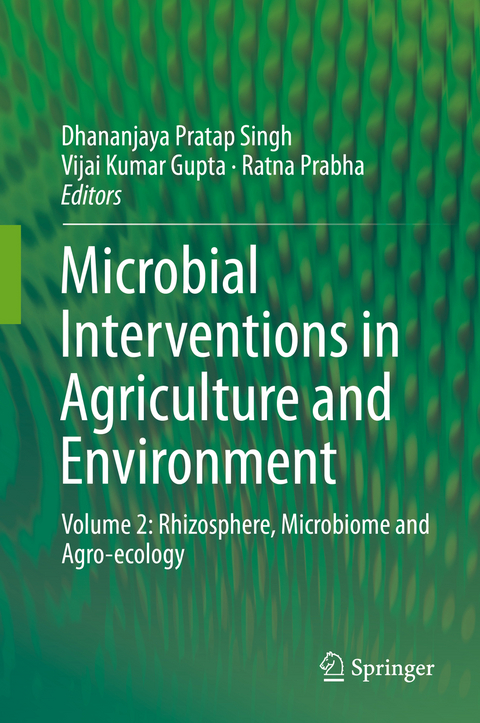
Microbial Interventions in Agriculture and Environment
Springer Verlag, Singapore
978-981-13-8382-3 (ISBN)
Dhananjaya P. Singh is presently Principal Scientist in Biotechnology at ICAR-National Bureau of Agriculturally Important Microorganisms, Maunath Bhanjan, India. He did his Masters' degree from G.B. Pant University of Agriculture & Technology, Pantnagar and Ph.D. in Biotechnology from Banaras Hindu University, Varanasi. His research interests include plant-microbe interactions, bioprospecting of metabolites of microbial and plant origin, microbe-mediated stress management in plants, metabolomics-driven search for small molecules and bioinformatics in microbial research. He has been working on the societal implications of microbial biotechnology pertaining to microbe-mediated crop production practices and rapid composting of residual agricultural wastes at farm and farmers levels. Such practices are now reaching among the farming communities for their adoption at field scale. He has been associated with the development of supercomputating infrastructure for agricultural bioinformatics in microbial domain at ICAR-NBAIM under National Agricultural Bioinformatics Grid (NABG) program of ICAR, India. He is an Associate of National Academy of Agricultural Sciences (NAAS), India and has been awarded with several prestigious awards including Dr. A. P. J. Abdul Kalam Award for Scientific Excellence. With more than 150 publications in the journals of National and International repute Dr. Singh has also edited five books on microbial research with Springer Nature and other publishers. Dr. Vijai Kumar Gupta is the Senior Scientist, ERA Chair of Green Chemistry, Tallinn University of Technology, Estonia. His area of research interests are- Bioactive Natural Products, Microbial Biotechnology and Applied Mycology, Bioprocess Technology, Biofuel & Biorefinery Research, Glycobiotechnology of Plant-Microbial Interactions. He is the Secretary of European Mycological Association, Country Ambassador of American Society of Microbiology. He is the Fellow of- Linnaean Society; Mycological Society of India; Associate Fellow of National Academy of Biological Sciences India; Indian Mycological Association. He has published several papers in internationally well reputed journals and edited many many books for international publishers including Springer Nature. Ratna Prabha is currently working as DST Women Scientist at ICAR-National Bureau of Agriculturally Important Microorganisms, India. With Doctorate in Biotechnology and Masters in Bioinformatics, she is actively involved in different research activities. Her research interest lies in microbe-mediated stress management in plants, database development, comparative microbial analysis, phylogenomics and pangenome analysis, metagenomics data analysis and microbe-mediated composting technology development and dissemination. She has been engaged in developing various digital databases on plants and microbesand has various edited and authored books, many book chapters, and different research papers and review articles in journals of international repute.
1. Microbial Inoculants for Sustainable Crop Management.- 2. Manufacturing and Quality Control of Inoculants from the Paradigm of Circular Agriculture.- 3.Microbial Biological Control of Diseases and Pests., 3.PGPR Inoculation and Chemical Fertilization of Cereal Crops, How do the Plants and Their Rhizosphere Microbial Communities’ Response?.- 4. PGPR Inoculation and Chemical Fertilization of Cereal Crops, How do the Plants and Their Rhizosphere Microbial Communities’ Response?.- 5. Biological Treatment: A Response to the Accumulation of Biosolids.- 6. Microbial Bioconversion of Agricultural Wastes for Rural Sanitation and Soil Carbon Enrichment.- 7. Plant Growth-Promoting Rhizobacteria (PGPRs): Functions and Benefits.- 8. Functional Diversity of Plant Growth Promoting Rhizobacteria: Recent Progress and Future Prospects.- 9. Microbial Augmentation of Salt Affected Soils: Emphasis on Haloalkalitolerant PGPR.- 10. Impact of Plant Associated Microbial Communities on Host Plants under Abiotic Stresses.- 11. Alleviating Drought Stress of Crops through PGPR: Mechanism and Application.- 12. Fertilizer Nitrogen as a Significant Driver of Rhizosphere Microbiome in Rice Paddies.- 13. Environmental Remediation: Microbial and Non-Microbial Prospects.- 14. Tree ecosystem: Microbial Dynamics and Functionality.- 15. Engineering Rhizobacterial Functions for the Improvement of Plant Growth and Disease Resistance.- 16. Impact Assessment of Microbial Formulations in Agricultural Soil.- 17. Harnessing the Microbial Interactions in Rhizosphere and Microbiome for Sustainable Agriculture .- 18. Plant Microbiome Interaction and the Effects of Biotic and Abiotic Components in Agroecosystem.- 19. Plant-Microbial Communication – New Facets for Sustainable Agriculture.
| Erscheinungsdatum | 29.11.2019 |
|---|---|
| Zusatzinfo | 27 Illustrations, color; 7 Illustrations, black and white; XIV, 573 p. 34 illus., 27 illus. in color. |
| Verlagsort | Singapore |
| Sprache | englisch |
| Maße | 155 x 235 mm |
| Themenwelt | Naturwissenschaften ► Biologie ► Mikrobiologie / Immunologie |
| Naturwissenschaften ► Biologie ► Ökologie / Naturschutz | |
| Weitere Fachgebiete ► Land- / Forstwirtschaft / Fischerei | |
| Schlagworte | Biological Control • bioremediation • Microbial Diversity and Functions • Plant and Soil Health • Plant growth promotion |
| ISBN-10 | 981-13-8382-0 / 9811383820 |
| ISBN-13 | 978-981-13-8382-3 / 9789811383823 |
| Zustand | Neuware |
| Haben Sie eine Frage zum Produkt? |
aus dem Bereich


